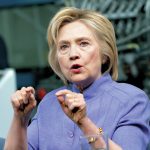NEW YORK — Neither Hillary Clinton nor Donald Trump is seen as likely to unify the U.S. if elected, but pessimism about the Republican candidate is far greater, according to a poll released Monday that reflects deep division in the country.
The survey from The Associated Press-NORC Center for Public Affairs Research found 73 percent of Americans believe Trump will further divide the country, compared with 43 percent saying that about Clinton.
While only about one-third of people believe Clinton’s election would bring unity, that’s still double the figure for Trump — 34 percent compared with 17 percent. Even among Republicans, just 38 percent saw their nominee as generating more national unity.
Overall, the poll painted a portrait of a stunningly fractured country. Some 85 percent of people regard the nation as more politically divided than in the past; 80 percent view Americans as being greatly divided on the most important values.
“It’s just not a pleasant time in the country,” said James Robertson, a Civil War historian at Virginia Tech. “The time is so unstable, it’s impossible to see the future.”
Seeing parallels to the 1850s and the lead-up to war, Robertson assessed this as the second-most divisive time in U.S. history. The climate, he said, is even worse than in the 1960s, because of the almost complete inability for lawmakers to find consensus and the tendency for minor disagreements to boil into huge rifts.
Asked to identify the main thing that divides Americans, one in four survey respondents cited political interests or values. Eighteen percent named economic interests or values; 14 percent said race and racism. Separately, big majorities faulted the news media and elected officials as putting too much focus on divisions.
And what unites Americans? Freedom and liberty are the top unifiers, cited by 16 percent of respondents. Perhaps reflective of the string of shootings and other painful recent events, 10 percent named crises or tragedies, making those the second-most cited unifiers. Those were followed by patriotism, fighting terrorism and other responses.
A slim majority, 52 percent, said America’s best days have passed. Those with favorable views of Clinton were far more likely to express optimism that the country’s best days are ahead than those with favorable views of Trump, 61 percent versus 39 percent.
David Raif, a 35-year-old preacher in Lansdowne, Pennsylvania, reflected the feelings of many respondents, who view both candidates as leading the U.S. to more division. He typically votes Republican but believes Trump’s character and tendency to attack others inherently lead to greater splits. Clinton’s personality, he believes, has more potential at unifying the country, but he sees her liberal policies as ultimately ending up dividing people, too. Neither candidate, he said, is driven by principles.
“Leadership with a lack of principles will lead the country down a road that will be more and more divisive,” Raif said.
The AP-NORC poll of 1,008 adults was conducted June 23-27 — before the political conventions — using a sample drawn from NORC’s probability-based AmeriSpeak panel, which is designed to be representative of the U.S. population. The margin of sampling error for all respondents is plus or minus 4.1 percentage points.
Some questions were asked of only half of respondents and have a higher margin of sampling error. Respondents were first selected randomly using address-based sampling methods, and later interviewed online or by phone.
Despite negativity expressed in the survey, it found 81 percent of Americans believe the U.S. is one of the greatest countries in the world, if not the greatest. Perhaps paradoxically, supporters of Trump, whose campaign mantra vows to return America to greatness, are more likely than Clinton supporters to say the U.S. already stands above all other countries. Older Americans are far more likely than younger people to rank the U.S. as the single greatest nation.
Mary Smith, a 79-year-old retired secretary in Willow Oak, Florida, rated the U.S. as the greatest country, saying she witnessed the goodness of its people as she moved from city to city with her late husband, a Navy submarine sailor. Each place they went, the Clinton supporter said, she found welcoming and kindness.
“I have traveled an awful lot and people were nice to me everywhere I went,” she said. “I really think we do more for our people than so many other countries do.”









